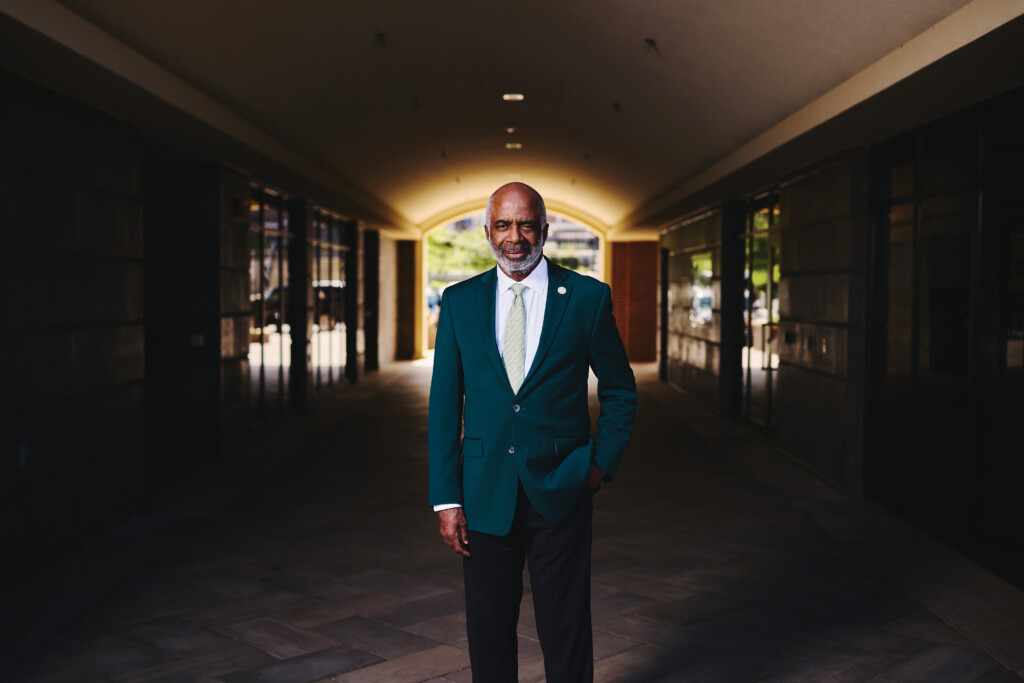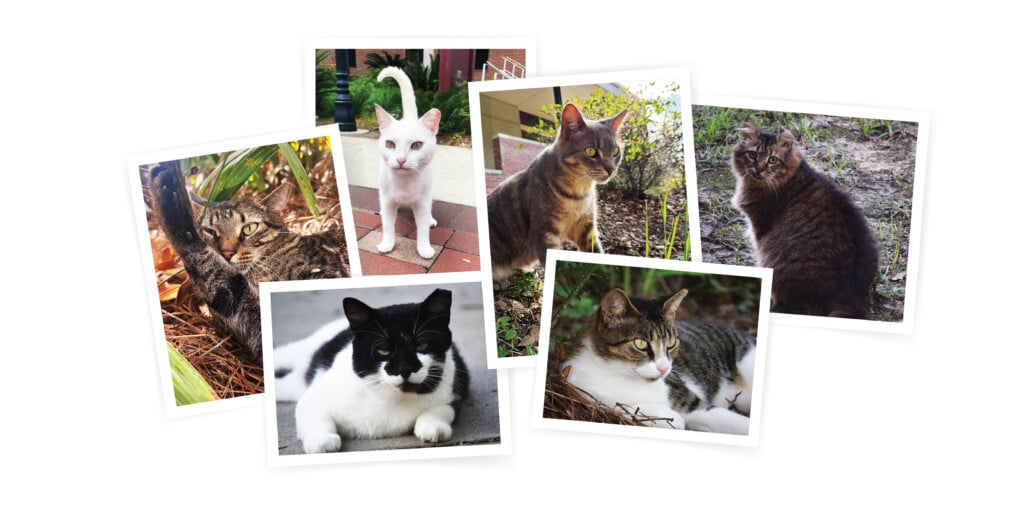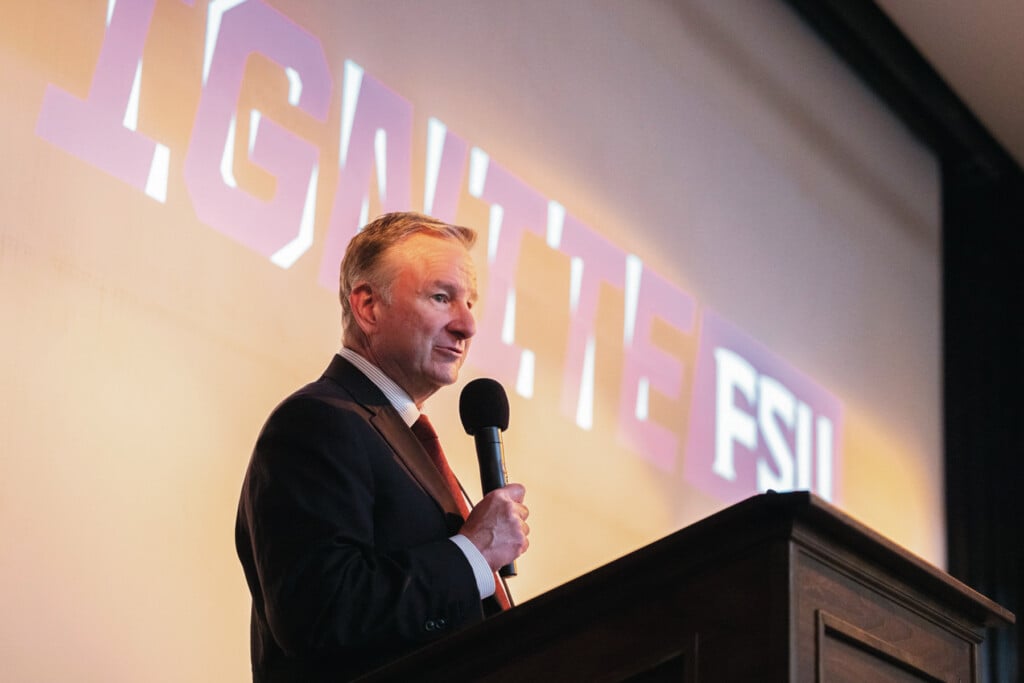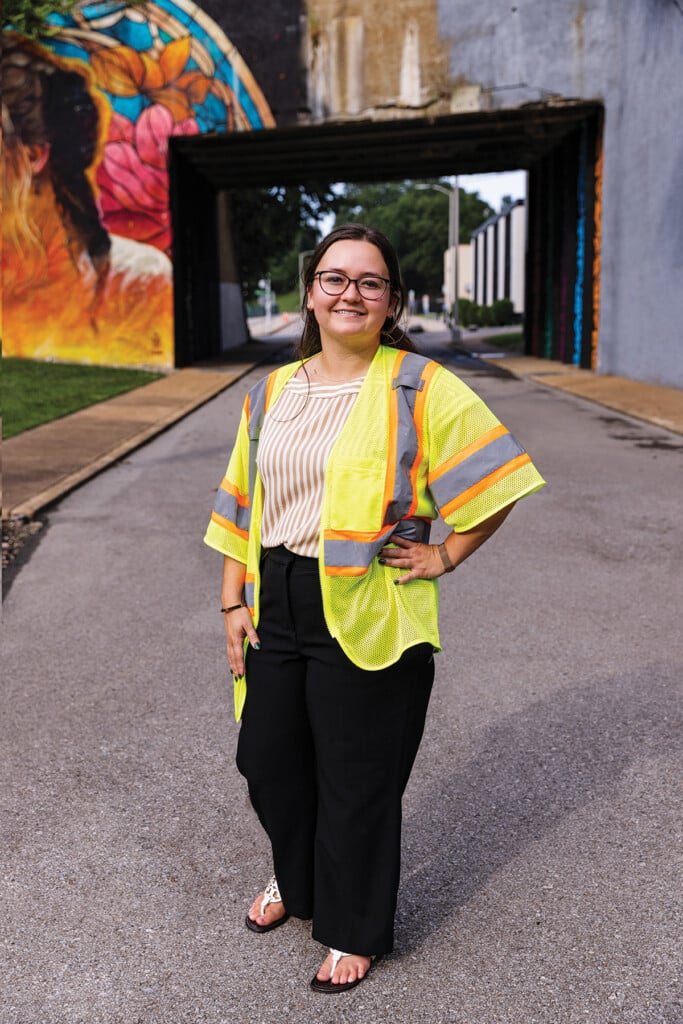Social Mobility at FAMU
Dr. Larry Robinson battled inequality with each new graduate

From humble origins to becoming the president of Florida A&M University, Dr. Larry Robinson is an inspirational figure in the Tallahassee community.
After his parents separated during his formative years, Robinson and his five siblings were raised by his extended family in Memphis, Tennessee. Despite being of limited financial means, he always knew he would go to college.
“It would have taken a train to stop me,” Robinson said of his dedication to higher pursuits, explaining that going to college was ingrained in him and his brothers and sisters at an early age. “My grandmother just insisted that one day we were going to go to college.”
Robinson and his siblings were first-generation college graduates. Though his mother graduated from high school and started college, her education was derailed after starting a family. Still, she got to see Robinson earn his degrees from Memphis State University and Washington University in St. Louis, respectively, before dying from cancer in the mid-’90s.
“At one point I wanted to find a cure for cancer,” Robinson said.
He had an idea in high school to develop a vaccination for cancer. This idea was ahead of its time. Recently, the United Kingdom’s National Institute of Health has partnered with BioNTech SE and hospitals across the country to administer personalized mRNA vaccines for the treatment of cancer.
However, despite his innovative ideas, Robinson rejected the idea for one crucial reason.
“Well, that wasn’t in the books for me because I couldn’t stand the sight of blood,” Robinson said. “But more importantly, I just wanted to learn about the basic things about the world, how the world works.”

During his tenure, Robinson successfully led FAMU to being named the No. 1 public HBCU in the country for five consecutive years. The school also rose to No. 91 in the U.S. News & World Report’s 2023–2024 Best Colleges rankings, fulfilling a goal outlined in the university’s “Boldly Striking” strategic plan. Photo by The Workmans
His older brother and sister preceded him in attending a university, but he was delayed after high school when his aunt became ill. She had been employed as a domestic worker for a private family in Kansas City. The family “basically just dropped her off,” Robinson said, without any funds or aid. She did not have any health insurance nor means to care for herself.
With his older siblings already in college, Robinson decided it was his turn to give back to his family in a meaningful way.
Caring for his infirm aunt delayed his journey to higher education, but the experience made an impact that he carries with him to this day. He wanted to pursue a life and status denied to his mother and aunt and chose science as his focus.
In his own words, Robinson said he “had a small, minor aptitude for science,” which is a colossal understatement. Robinson has enjoyed a storied career in the sciences, contributing to a plethora of fields from nuclear science and trace element analysis to environmental science and paleontology.
In addition to his publications and contributions to his fields of interest, Robinson has served as a senior scientific advisor in the U.S. Department of Agriculture’s Cooperative State Research, Education and Extension Service. He was confirmed by the U.S. Senate as assistant secretary of Commerce for Conservation and Management at the National Oceanic and Atmospheric Administration in 2010. After the BP oil spill, Robinson became part of the Ocean Policy Task Force and Gulf Coast Restoration Task Force. And, of course, Robinson has spent the better part of his career advancing FAMU, from being a visiting professor in 1995 to its president.

Photo by The Workmans
Reaching such a high level of success took dogged determination and a relentless spirit, but Robinson identifies with underprivileged students who have to work to get by while earning a degree and don’t have emotional or financial support while living on campus.
“When a student crosses the threshold here, we feel like since we did it, a student can obviously do it,” Robinson said. “And it’s a matter of how do we make sure we provide opportunities and the resources for those students to succeed?”
Many students around the country have to maintain jobs while pursuing their degrees. According to the United States Department of Education in a 2022 report, 41.7% of full-time students and 78.4% of part-time students have to perform at jobs while taking classes. Robinson also worked his way through college, first as a tutor to other students, and then as a laboratory assistant in the chemical store room.
“I can relate to those students who can’t go home and tell mom and dad about, ‘I didn’t do well on the biology test,’” Robinson said of his time at Memphis State University. “One of the things that I can relate to is the challenges students have regarding their financial status and so forth. We still have a significant number of first-generation students who can relate to that.”
Robinson understands that every student attending FAMU has “a story,” and he wants to help them succeed in any way he can.
The success of an institution depends on metrics such as graduation rates, fundraising and research, but “one of the most important to me — that is most meaningful — is the social mobility,” Robinson explained, which is a measure of the socioeconomic status of students entering and “how effectively we can get them out into the world.”
Being ranked among national universities adds prestige to colleges, but the social mobility of FAMU shows “that even today, we’re transforming the lives of students fairly immediately and very effectively through the array of academic programs that we have.”
No one finds success without help along the way, which is why Robinson recognized the importance of strong mentorship. For him, a professor who made a difference was Dr. J.C. Williams, “who was primarily responsible for me going to Washington University in Saint Louis.”

Photo by The Workmans
During his senior year at Memphis, Robinson was up for an award from the American Institute of Chemistry for the highest GPA but was summoned from class to a meeting with the chemistry department chair to be informed that he would not be receiving the award. At the time, Robinson didn’t care. He just wanted to get back to class, but Williams “was very, very disturbed by the course of events.”
Williams went to bat against his colleagues to get Robinson the award he’d earned. Although the honorific was not a major concern at the time, the support from his professor meant a lot, and he is obliged to fight for his students at FAMU.
Robinson wanted to focus on the virtuous side of his experience and for people to know, “You have a lot of J.C. Williamses running around, who are trying to think about students and encouraging them to be the best that they can and believing that they can be.”
Most people who meet Robinson would agree that he is far from ordinary, but he said of his own struggles as a student, “I was not born with a nuclear spoon in my mouth. I mean, I had to get out there and learn science just like everybody else does.”
Robinson is excited about the path his team has forged for the student body at FAMU. In his own words, “We have a wonderful team, from our board of trustees to our faculty and staff, you know, (and we) put our arms around these students and sort of help everybody else understand what success means.”
Dr. Robinson admitted that he missed working with students, and with the recent announcement of his resignation, it looks like he may return to the classroom soon.
Presidential Ambassadors

Presidential Ambassadors. Photo courtesy of FAMU
One of the ways FAMU President Dr. Larry Robinson mentored students during his tenure was via the school’s Presidential Ambassadors (PA) program. Founded in 1985 by then-FAMU President Frederick S. Humphries, the program requires selected students to recruit scholars, promote the university’s brand and act as hosts during events, allowing ambassadors to hone their leadership and communication skills, and further their personal and professional goals. To become an ambassador, students must apply and meet certain criteria. Once the PA Selection Committee makes its decisions, the president announces the newly appointed ambassadors.
The Presidential Ambassadors for the 2024–2025 school year are:
Zion Afolabi, Rahjade Anderson, Nikiyah Brown, Kobe Buggs, Christian C. Ellis, Kandon Fears, Haleigh Ferguson, Laila Fields, Rayn Fields, Alyssa Filius, Dominique R. Ford, Zayda Greene, Miles Howard, Grace K. Jacobs, Ashton Johnson, Nadia Johnson, Hannah Kirby, Jordan C. McCrary, Tamara McGhee, Kailah Alexis Moorer, Kelisia Morrison, Bilal S. Muhammad, Alyce-Dean Owens, Jasmine G. Phillips, Saadia Prevost, Kristopher Alexander Ramos, Issac J. Richardson, Taylor Sharperson, Zariah Smalls, John Ray Stokes, Joseph Stuckey V., Lailah Timmons, Kailey Denise Watkins, Bryce White and Nyla R. Williams.
For more information about the program, please visit FAMU.edu.


